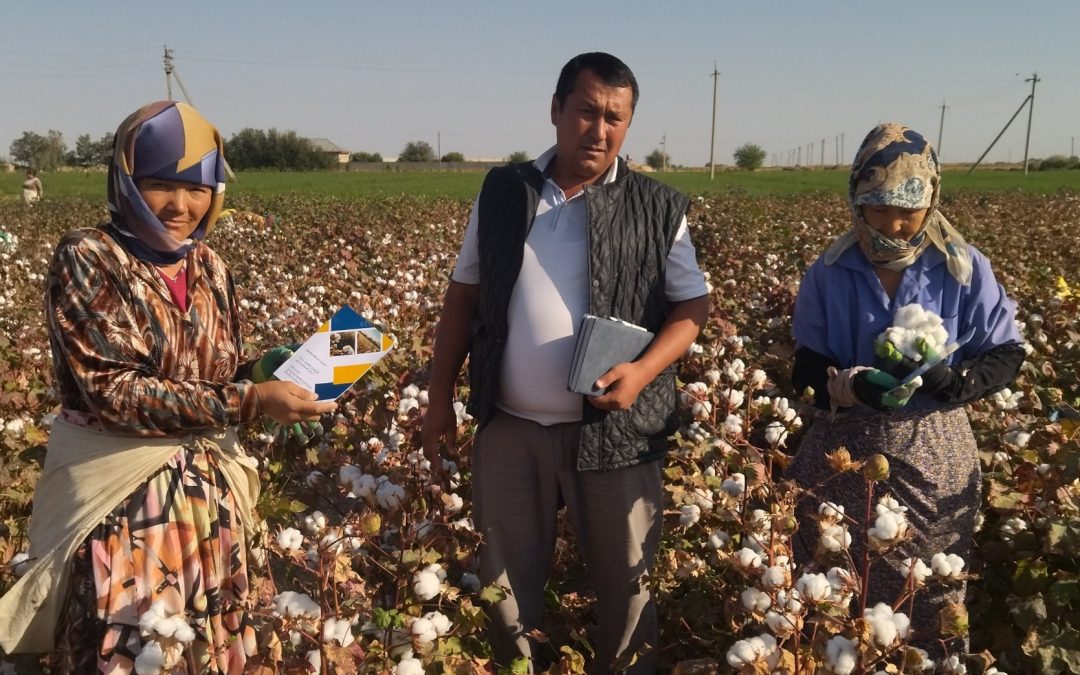
Oct 7, 2024
World Cotton Day – October 9, 2024: As ubiquitous as cotton is in our everyday lives, the workers who produce and harvest this foundational crop are often invisible. This was long the case in Uzbekistan, where for decades the government forcibly mobilized millions of people, sometimes including children, to harvest cotton for state-owned enterprises. A long-running global advocacy campaign led by the Cotton Campaign, of which Solidarity Center was a founding member, helped push the government to implement reforms that brought that system to an end in 2021.
Ending state-organized forced labor was a major accomplishment, but establishing just and equitable working conditions in the cotton sector is a longer journey. With support from the U.S. Department of Labor, the Solidarity Center is working to put in place building blocks that will allow workers to ensure their rights are protected. The Solidarity Center signed an agreement with the Ministry of Employment and Poverty Reduction of the Republic of Uzbekistan and the project’s co-implementing partner, the Center for International Private Enterprise (CIPE), in December 2022 to begin project work. As the 2023 harvest season gets underway, Solidarity Center and CIPE are working closely with stakeholders in government, civil society and business to work from the field up and from oversight authorities down to build knowledge within the cotton sector about fundamental rights and strengthen mechanisms to ensure those rights are secured.
For the 2023 harvest, this includes:
- In collaboration with the ministry’s labor inspection and legal team, the Solidarity Center and CIPE have prepared and printed more than 10,000 leaflets for distribution to cotton pickers during the ongoing harvest season. These leaflets provide cotton pickers with accessible and comprehensive information about their fundamental rights as seasonal workers under Uzbekistan’s Labor Code. The content covers essential worker protections and includes critical contact information, such as the Labor Inspection hotline and a project-run Telegram channel, where workers can anonymously report violations and seek free legal consultation. The leaflets have been also distributed to groups working in different regions across Uzbekistan to maximize outreach. This initiative plays a crucial role in raising awareness among seasonal workers, ensuring they are informed of their rights and the enforcement mechanisms available to them if their rights are violated. Providing clear and accessible information about legal protections and enforcement channels will be essential to empowering cotton workers to assert their rights, and increased awareness is critical to improving compliance with international labor standards, which is the route to creating a more sustainable and transparent cotton sector.
- The Solidarity Center, in partnership with the Tashkent Mediation Center and the State Labor Inspectorate, successfully conducted a two-day training session October 2–3 in Tashkent aimed at enhancing the capacity of mediators to resolve individual labor disputes. The training, facilitated by a regional expert, introduced participants to mediation as an alternative mechanism for labor dispute resolution. The comprehensive curriculum, a blend of theoretical knowledge and practical exercises, equipped 10 mediators from the Tashkent Mediation Center and Labor Inspection staff with the skills to mediate and effectively resolve individual labor disputes. The head of the Labor Inspectorate emphasized the importance of continued collaboration and capacity building as critical to providing workers in the cotton sector with an effective remedy for labor rights violations.
These harvest-period activities supplement an ongoing rights awareness and education program the Solidarity Center and CIPE are implementing with workers and employers in the cotton sector. A core priority of that program in the coming year will be to ensure that all workers in the cotton sector have a written employment contract with clear, enforceable conditions of work. Employment contracts are vital to healthy labor relations that, unfortunately, are absent in many agricultural supply chains.
Recent reforms in Uzbekistan requiring labor contracts for all workers in cotton production have the potential to help the country distinguish itself as a high-road option for textile sourcing, if those reforms can be implemented and enforced. Developing workplace-level reporting and monitoring systems for workers to verify their rights are being respected, and to seek remedy if they are not, will be an important next step to positioning Uzbekistan as a leader in developing sustainable and just textile supply chains.
Funding is provided by the United States Department of Labor under cooperative agreement number IL-38908-22-75-K, through a sub-award from the Solidarity Center. 100% of the total costs of the project or program is financed with federal funds, for a total of $1,018,814. This material does not necessarily reflect the views or policies of the United States Department of Labor, nor does mention of trade names, commercial products, or organizations imply endorsement by the United States Government.
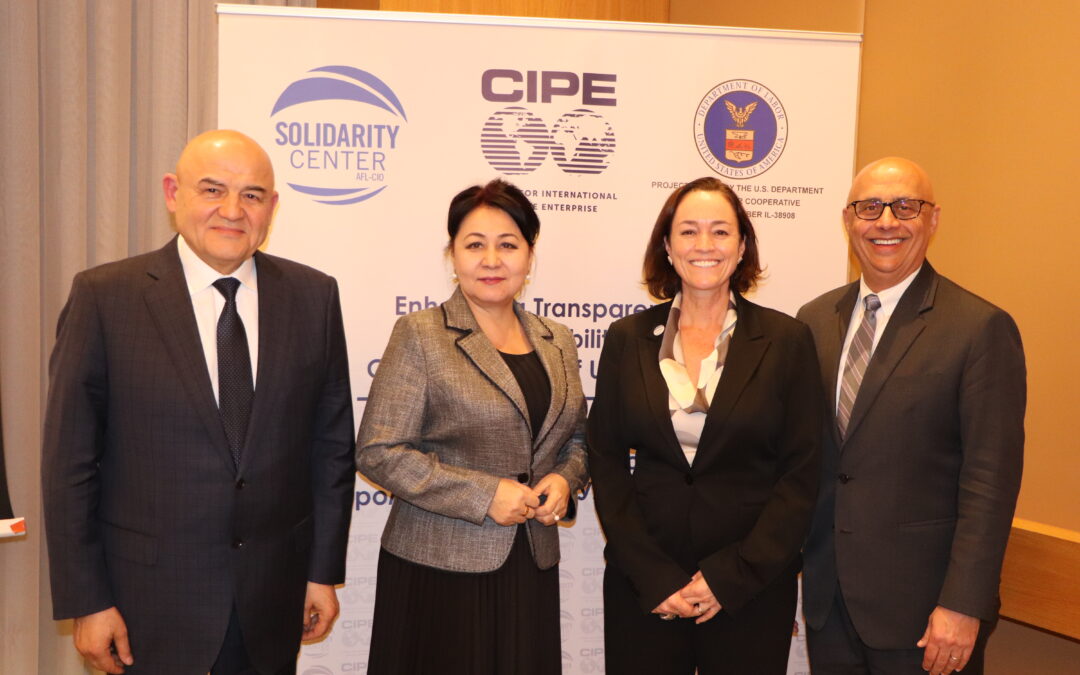
Jan 8, 2024
A groundbreaking cooperative agreement seeking to improve working conditions and prevent forced labor was signed this week for workers, ‘at all stages of cotton and textile production in Uzbekistan.’ Agreement signatories include U.S.-based Center for International Private Enterprise (CIPE), employers’ Association of Cotton-Textile Clusters of Uzbekistan, the Solidarity Center and the Uzbekistan Ministry of Employment.
The two-year memorandum of cooperation is the cornerstone of a new CIPE-Solidarity Center project that was launched at a public event in Tashkent in November. By meeting the sector’s need for an effective reporting and grievance remedy system, and providing an education and incentive system supportive to compliance, the project seeks to build on a 15-year effort that successfully eradicated forced labor in Uzbekistan’s cotton supply chain.
The “Enhancing Transparency and Accountability in the Cotton Industry of Uzbekistan” project—which will be implemented by CIPE and the Solidarity Center through activities laid out in the agreement’s accompanying action plan—is funded by the U.S. Department of Labor.
“The Solidarity Center looks forward to working with CIPE and the Cluster Association to support development of a cotton industry in Uzbekistan that is recognized and rewarded in the global marketplace for upholding labor standards at the highest levels,” said Solidarity Center Executive Director Shawna Bader-Blau at the program launch.
Project goals include to expand stakeholder dialogue to promote transparent market and management standards and employee-oriented accountability systems; establish trust and dialogue among cotton purchasers, producers, workers and the government of Uzbekistan; strengthen Uzbekistan’s cotton supply chain workers’ capacity to identify and effectively resolve labor rights violations through tripartite mechanisms and improved dialogue with employers; improve compliance with international labor standards, including freedom of association and corporate governance provisions; and foster cotton industry sustainability in ways that ensure labor rights are respected and protected.
Under the agreement’s accompanying action plan, program activities will include:
- Developing and piloting worker-led grievance and remedy mechanisms grounded in best international practices for supply chain transparency and management;
- Training workers, managers and employers in the cotton industry on fundamental international standards as defined in core conventions of the International Labor Organization;
- Promoting standards of transparency and commitment to labor rights and good corporate governance by creating a dialogue between stakeholders cotton enterprises, global brands, government agencies and worker representatives.
“We believe that our partnership will support the creation of effective management systems and serves to strengthen social protection, improve labor relations based on international standards and create decent and safe working conditions for workers,” said CIPE Managing Director for Programs Abdulwahab Alkebsi at the program launch.
After years of intense policy advocacy and campaigning, led by Uzbek and international civil society, combined with the Uzbek Government’s political will, state-imposed forced labor is no longer used in the cotton harvest. As a result, in March 2022, the Cotton Campaign ended its call for a global boycott of cotton from Uzbekistan and lifted the Uzbek Cotton Pledge.
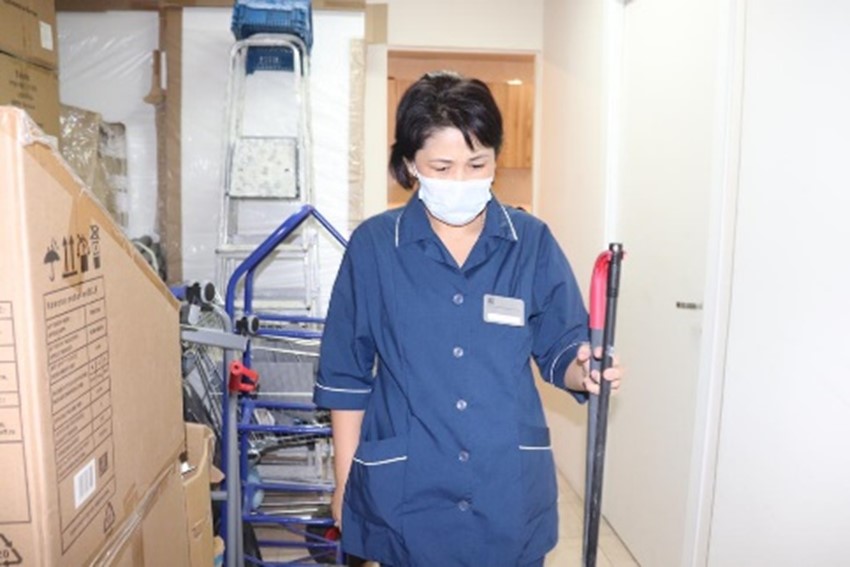
Feb 24, 2022
A study conducted by Insan-Leilek, a Kyrgyz migrant worker foundation, and the Trade Union of Migrants of the Kyrgyz Republic documents abuses suffered by many who migrate to Russia to earn their livelihoods as nannies, adult caregivers, cooks, cleaners and live-in domestic workers. An estimated 750,000 Kyrgyz people have migrated to Russia for work; official Kyrgyz government data estimates that half that number are women.
“We are invisible people,” says 34-year-old survey respondent and domestic worker Almagul. (Her last name is withheld to protect her livelihood and personal safety.)
“The Problems of Informal Domestic Workers,” reflects the experiences of 300 Kyrgyz migrant domestic workers, from whom 24 were selected for in-depth interviews by two migrant worker experts. Respondents’ jobs were in the Russian cities of Kazan, Moscow, Novosibirsk, Samara and Yekaterinburg.
The study reveals a wide range of employment abuses among the mostly female domestic workers who were surveyed, including sexual harassment and violence, other forms of physical and emotional abuse, unpaid hours, excessive workloads, denial of time off and wage theft.
More than 80 percent of the female survey participants who provided in-depth interviews reported sexual harassment at the hands of their employers. Of this group, almost 4 percent had experienced severe sexual violence, including rape, while 25 percent were subjected to indecent touching that included unwanted touching of intimate body parts. More than 30 percent of those reporting sexual harassment and violence said they could not ask anyone for help or support and, of this number, 7 percent attempted suicide. More than 70 percent of those providing in-depth interviews said they were often beaten, allegedly for laziness, and that they can rarely go out.
Two survey participants reported having become surrogate mothers for their employers without a written agreement or fair compensation.
Almost 90 percent of the larger group surveyed (300 respondents) were working without a formal contract because they had secured their jobs through personal connections. Such workers are vulnerable to unregulated work in which hours, pay, duties and conditions are determined at the whim of the employer, some of whom are unscrupulous and exploitive.
“I worked 24 hours a day, and I looked after the children, cooked, did the laundry. Weekends were out of the question,” reports Miraida about a job she held in Russia when she was 18.
Kyrgyz domestic workers in Russia provide an average of 10 hours of work per day, a survey of the larger group of 300 found. Of these, those who live in an employers’ home are working an average of more than 12 hours per day. More than 40 percent said they perform additional services that were not agreed with the employer at the time of hiring, without adjusted compensation.
Respondents were recruited for the survey through Trade Union of Migrants of the Kyrgyz Republic WhatsApp groups and Insan-Leilek diaspora organizations and migrant communities. In-depth interviews were conducted online and over the phone.
Russia is the main destination for approximately 750,000 of Kyrgyzstan’s labor migrants. Official data on the percentage of migrant women employed in domestic work in Russia does not exist.
Insan-Leilek foundation and the Trade Union of Migrants of the Kyrgyz Republic are actively engaged in anti-trafficking programs in Kyrgyzstan, with Solidarity Center support, including last year’s “100 Days Against Trafficking in Persons” youth campaign.
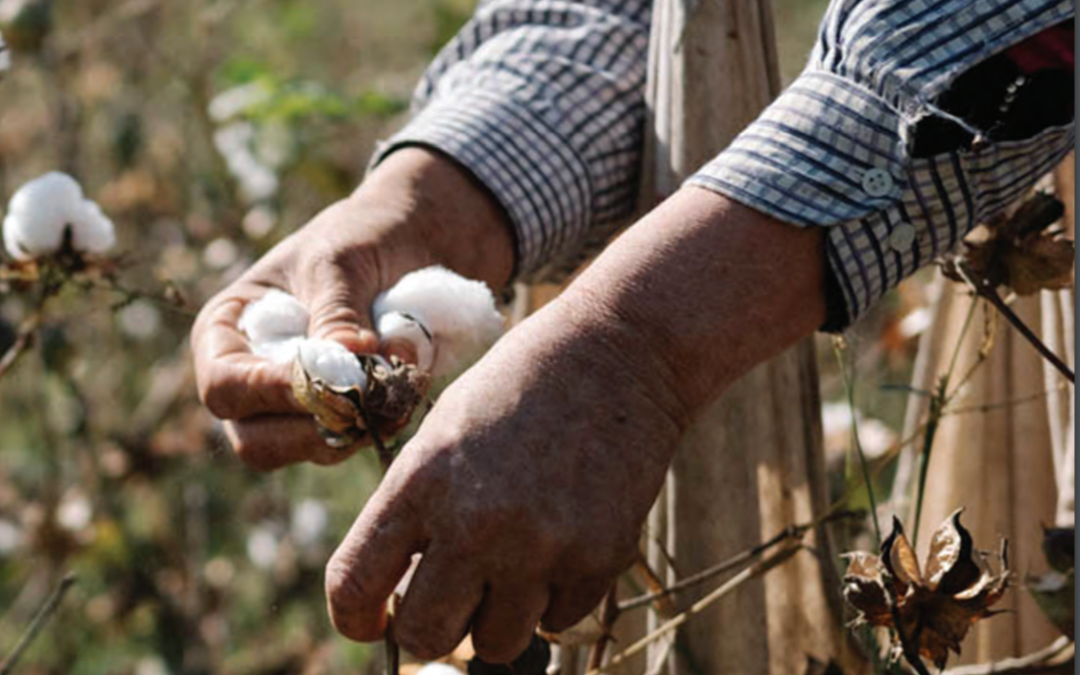
Jun 26, 2020
A new report on Uzbekistan’s 2019 cotton harvest by Uzbek Forum for Human Rights documents progress toward ending—but not eradication—of state-sponsored forced labor, says the Cotton Campaign.
The report, “Tashkent’s Reforms Have Not Yet Reached Us,” finds that a state-imposed cotton quota, labor shortages, lack of fair and independent recruitment channels, and weak accountability systems contribute to the continuation of forced labor in Uzbekistan’s cotton fields—and that broader reform efforts in the country are being limited by slow progress on civil society freedoms.
The report’s findings are based on more than 100 in-depth and hundreds of short interviews with people involved in the cotton harvest, as well as field visits, farm monitoring in six regions, and data and analysis from a nationwide online survey conducted in partnership with the Solidarity Center and public polling/research firm RIWI Corp.
Employees of state and privately owned enterprises in interviews consistently reported being unable to refuse orders to pick cotton by government officials or employers for fear of dismissal or other job-related consequences. About half of online survey respondents said they could not refuse when asked to go to the fields or pay for a replacement picker. This testimony underscores the pressing need to establish effective recruitment systems free from interference or coercion by the government or the authorities, says the Uzbek Forum for Human Rights.
The report also documents that reform of civil society freedoms has lagged far behind the pace of reforms in other key areas, inhibiting the freedom of citizens to form civic associations such as nongovernmental organizations (NGOs) and independent trade unions empowered to fight forced labor in Uzbekistan. The report notes with concern the small number of independent, self-initiated NGOs registered in the country and the high number of rejections for registration.
“Independent NGOs, unions and civic activists have a central role to play in the reform process in promoting transparency and accountability,” says Solidarity Center’s Eastern Europe/Central Asia Director, Rudy Porter. “There is a pressing need to guarantee basic civic freedoms to empower activists to conduct independent monitoring and ensure labor practices are in line with international standards.”
The U.S. State Department’s annual Trafficking in Persons report yesterday specified that Uzbekistan will remain on its Tier 2 watchlist because the country does not yet meet the minimum standards set out in the U.S. Trafficking Victims Protection Act. The report noted that, “During 2019, the government continued to demand farmers and local officials fulfill state-assigned cotton production quotas or face penalties, which caused local officials to compel work in the annual cotton harvest.”
The Cotton Campaign, of which Solidarity Center is a member, is a global coalition of human rights, labor, responsible investor and business organizations dedicated to eradicating child and forced labor in cotton production in Uzbekistan and Turkmenistan. A Cotton Campaign roadmap for the government of Uzbekistan to dismantle the forced labor system of cotton production was presented to government officials during high-level meetings in Tashkent in May 2018.
Photo: Tashkent region, 2019. Credit: Uzbek Forum for Human Rights
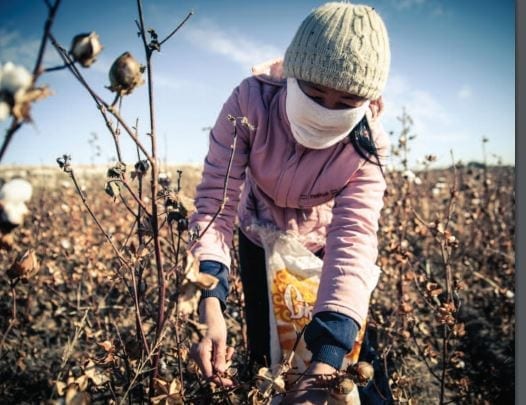
Jun 28, 2017
The World Bank is funding half a billion dollars in agricultural projects linked to forced and child labor in Uzbekistan, said Human Rights Watch (HRW) and the Uzbek-German Forum for Human Rights (UGF) in a report released today.
Even though the Uzbek government promised the Bank that it would not use forced or child labor linked to the projects or within project areas, and the Bank promised to independently monitor for abuses and create a way for victims to seek redress, in 2015 and 2016 forced labor continued. Under the loan agreements, the Uzbek government is required to comply with laws prohibiting forced and child labor, and the World Bank can suspend the loans if there is credible evidence of violations.
“The World Bank is giving Uzbekistan cover for an abusive labor system in its cotton industry,” said Umida Niyazova, director of the Uzbek-German Forum for Human Rights.
“‘We Can’t Refuse to Pick Cotton’: Forced and Child Labor Linked to World Bank Group Investments in Uzbekistan” details how the Uzbek government forced students, teachers, medical workers, other government employees, private-sector employees, and sometimes children to harvest cotton in 2015 and 2016, as well as to weed the fields and plant cotton in the spring of 2016. An estimated 1 million doctors, teachers, nurses and others are forced by the state to harvest cotton each year in the fall.
The report—based on hundreds of interviews and conversations with victims of forced and child labor, farmers, and key actors in the forced labor system, leaked government documents, and statements by government officials—shows that citizens continued to work in the cotton fields because of government threats of violence, firing, stopping welfare payments and the suspension or expulsion of students.
District Mayor Uktam Kurbanov reportedly said to one picker at a cotton meeting in Khazarasp, Khorezm region on September 29, 2015: “What’s this? You delivered only 1,286 kilograms? Why is that? I’ll tear your head off!”
Said a school director in the Fergana region on September 29, 2016: “I won’t call the complaint line number we were given. There is no use… All these calls [to the hotlines] will result in simple teachers and medical workers losing their jobs.”
Uzbekistan is the fifth largest cotton producer in the world. The country’s cotton industry generates more than $1 billion in annual revenue, or about a quarter of the country’s gross domestic product (GDP).
The UGF and HRW are members of the Cotton Campaign, as is the Solidarity Center. The campaign works to end the injustice of forced labor in cotton harvesting in Uzbekistan and Turkmenistan.





